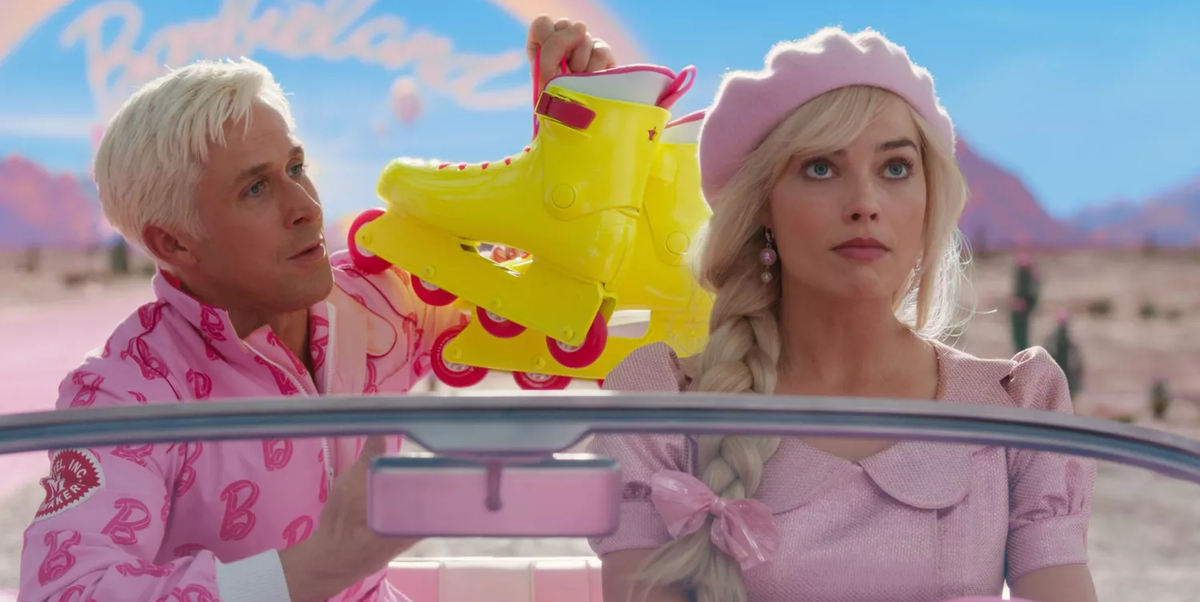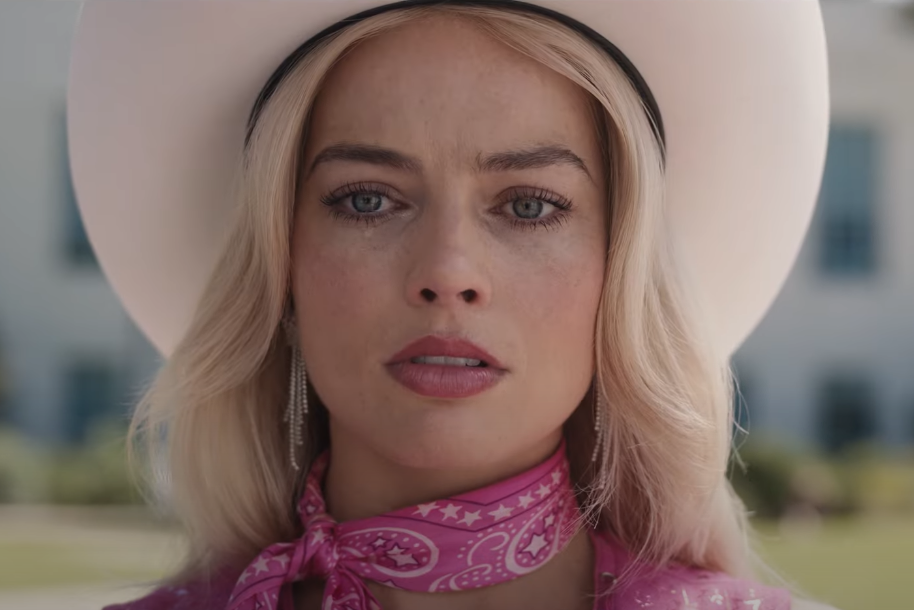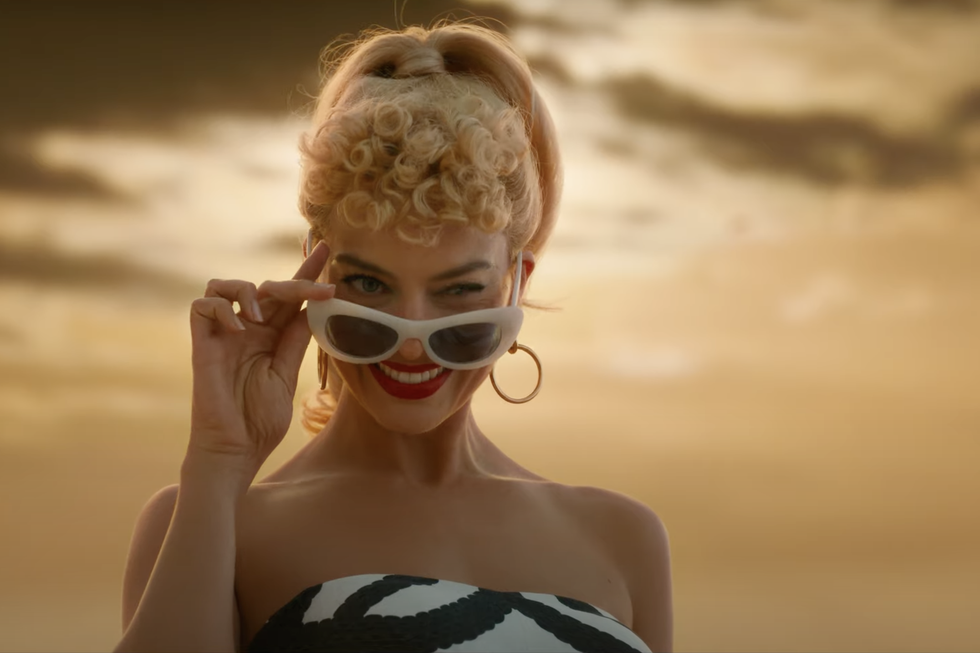For months, the Barbie movie’s vast unknown has been one of its greatest assets. What little we understood amounted to a pair of highlighter-yellow rollerblades, dangled aloft by the spray-tanned arms of a bleached-blond Ryan Gosling: nostalgic, symbolic, a triumph of marketing honed along a (plastic) razor’s edge. Every new set photo, character poster, and teaser trailer that collected over the months leading up to Barbie’s July 21 release has been received and dissected with the self-serious thrill of an 8-year-old planning their themed birthday party. Which, to be clear, is exactly as it should be. Questioning Barbie, like assembling an identity as a child, is a necessary pursuit. This is what movies like Barbie—and icons like the doll herself—are made for: both the simple pleasure and the outrageous nuance of mythologizing.
The secrets of director Greta Gerwig’s long-anticipated film are, in fact, starting to dissolve: The Los Angeles premiere prompted a round of spoiler-free first reactions (mostly positive), and the official critic review embargo is reportedly up soon. But even with the film finally accumulating eyeballs, there’s still a collective sense of protectiveness over the Barbie brouhaha. We don’t want the mania to break, not yet. There are still ample dopamine deposits to be discovered in deliberating what, precisely, Barbie has to say. After a promotional music video dropped yesterday featuring Gosling’s Ken serenading his second-rate status, one particular TikTok comment best summarized this feeling: “Every time I see a trailer for this movie I am more confused but I also want to see it more.”
Even Barbie star Issa Rae has enjoyed the opacity. As she shared in a December 2022 Hollywood Reporter story, she was perplexed when Gerwig first presented the story to her. “I’ll be 100 percent honest, when she was talking, like, it was entertaining, but I didn’t get it.” she said. “I was like, ‘I don’t know what the fuck she was talking about, but whatever it is, I’m excited she’s behind it.’ And then reading it was, like, ‘Oh my God, I love her even more.’”
So, then, what is Barbie about? My hope is that actually watching the plot play out will only heighten the debate. The film’s IMDb logline encourages that possibility: “Barbie suffers a crisis that leads her to question her world and her existence.” If Barbie’s questioning herself, why would we not want to do the same?
Thus far, we’ve had such fascinating theories on the objective of her eponymous film:
1) It’s about having an existential crisis (and also, death).
Here’s what we know for sure: In Barbie, our protagonist finds herself losing her grip over her inherent Barbie-ness. “Do you guys ever think about dying?” she asks during one of her classic blowout parties, earning stunned, judgment silence in response. Dolls don’t die! Matters only worsen from there: Suddenly, her fake shower is freezing; she falls, rather than floats, from her rooftop into her convertible; her feet slump from their iconic arch. To remedy this imperfection, she’s instructed to explore the “real world,” so she can know “the truth about the universe.”
The problem with the “truth about the universe” is that it’s a hot mess, and people die. Barbie is not a mess, nor does she ever die. She doesn’t even age. This supposedly irreconcilable truth seems to be Gerwig’s entry point to dissecting the artifice we’ve built around Barbie as a symbol of idealized femininity. What about perfectionism remains so enticing, even when we know and acknowledge its fruitlessness? And what about the changelessness of Barbie makes her seem like the perfect woman?
2) It’s about Ken becoming a villain. Or something.
The logline attached to the full Barbie trailer lays out an intriguing path for Ken, Barbie’s eternal boyfriend: “To live in Barbie Land is to be a perfect being in a perfect place. Unless you have a full-on existential crisis. Or you’re a Ken.”
One TikTok theory posited that Ken didn’t belong in Barbie Land because he’s “an imposter,” owing to the unexpected casting of Gosling in the role. The “Just Ken” music video further establishes that Ken can’t extricate himself from Barbie, though she finds him only ancillary. If Barbie were to cozy up to Don’t Worry Darling, the film might depict Ken growing resentful over his lesser billing beside a more successful female partner. He might even discover the real world is a rather agreeable place for cis, white, supposedly heterosexual men like himself. (Of course, we shouldn’t assume Ken’s sexuality isn’t fluid. Or that he has a sexuality! He’s a doll!) Might he then want to stay?
Even if Barbie doesn’t lay out its “men are problematic” bent quite so literally, it’s already clear Gosling’s performance is one of the best of the film. If that’s the case, there’s one hell of a debate to be had over why Ken’s character arc is so essential to our understanding of Barbie herself.
3) It’s about the inescapable clutch of corporations.
We can’t talk about Barbie without talking about the marketing of Barbie. It is everywhere: on Krispy Kreme donuts and Ruggable rugs and OPI nail polish and GAP T-shirts and toothbrushes and luggage and pool floats and ice cream and frozen yogurt and makeup and cars and blankets and hairbrushes and heels. Her Dreamhouse is on Airbnb. Every publicist pushing sunglasses or sex toys has retooled their strategy around “Barbiecore” for the summer. I have never worn so much pink in my life.
The problem with all this consumerism is jarringly obvious, even (and perhaps especially) when it’s a great deal of fun. And with fervor comes backlash, as witnessed in critiques that Barbie is little more than a flashy commercial for toy brand Mattel. These critiques, by the way, are correct. At the same time, the Mattel CEO is an actual character in Barbie (played by Will Ferrell), and all signs point to him as a primary antagonist. Therein lies the rub: Barbie is a brand, and is therefore about branding, and is then a critique of branding, in the same breath as it further establishes that branding. You see? We could keep talking about this! Forever!
4) It’s about feminism.
Well, yeah. Duh.
5) It’s about the swan song of girlhood.
[Young girls] are “funny and brash and confident, and then they just—stop,” Gerwig told Vogue in May. “How is this journey the same thing that a teenage girl feels? All of a sudden, she thinks, Oh, I’m not good enough.” It’s clear that a big chunk of Barbie’s aim is to explore why girls abandon not only their Barbie dolls, but some of the positive beliefs associated with them.
“We haven’t played with Barbies since we were, like, five years old,” a group of teens tell Margot Robbie’s Barbie in the film trailer. Her face falls. If girls don’t need Barbie, what does she exist for? And who (or what) do they turn to instead? What happens to a girl to make her abandon what was previously such a source of enrichment? What does it mean to age, when Barbie herself cannot?
6) It’s about … Barbie.
Barbie is a plastic paradox. She is a narrow vision of womanhood, and she is also an everywoman. She has hundreds of jobs and has never worked a day in her life. (She is also, importantly, not alive.) She is more than 60 years old and eternally, vaguely 20-something. (Past reports indicate Mattel claims she’s 19.) She is sexy but sexless. She’s a child’s plaything, with influence felt widely on adults.
“If you love Barbie, this movie is for you,” reads the copy in the Barbie trailer. “If you hate Barbie, this movie is for you.” There is no clearer case for why the Barbie discourse should continue long past the film’s ecstatic release. She is—as the memes tout—everything! Her movie is all of the above! We need not agree on every one of Barbie’s precise intentions; we need only recognize why there’s so much more to dissect than an endless onslaught of pink.
Culture Writer
Lauren Puckett-Pope is a staff culture writer at ELLE, where she primarily covers film, television and books. She was previously an associate editor at ELLE.


